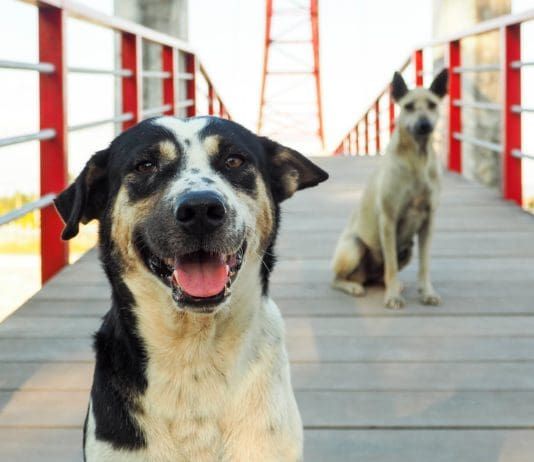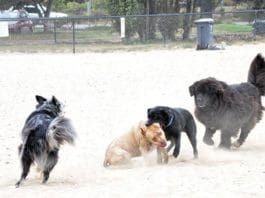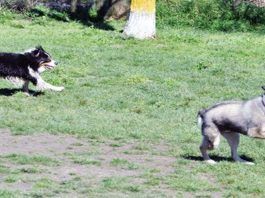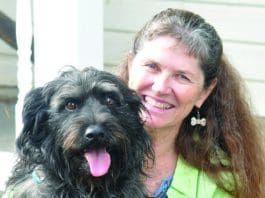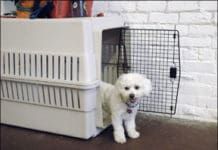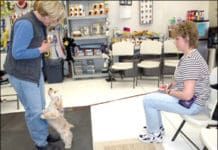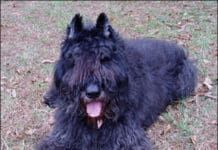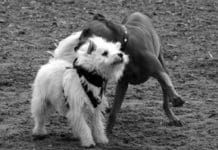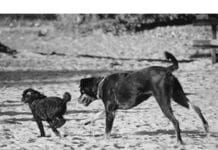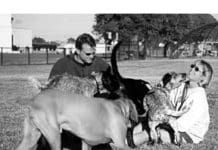Socializing a Shy Dog
Somewhere at this very moment, perhaps at a shelter near you, a frightened dog huddles in the back of her kennel, trembling, terrified by a chaotic overload of sensory stimuli: sights, smells, and sounds that are far beyond her ability to cope. Somewhere, today, a warmhearted, caring person is going to feel sorry for this dog - or one similar - believing that love will be enough to rehabilitate the frightened canine. Sometimes, it is. More often, though, the compassionate adopter finds herself with a much larger project than she bargained for. While shelters can a prime source for frightened and shy dogs, they are certainly not the only source. Pet stores, puppy mills, rescue groups, and irresponsible breeders (even some who breed top quality show dogs) can all be guilty of foisting off temperamentally unsound (due to genetics/nature) or under-socialized (due to environment/nurture) puppies and adult dogs on unprepared adopters.
Train Your Dog to Greet People
Recently, I switched the group class format at my Peaceable Paws Training Center to Levels." Instead of a progressive curriculum with new exercises introduced each week
Is Your Dog On Guard, Eliminating Unwanted Canine Behaviors
Ever had a dog who won't give you his bone or toy if you try to take it from him? Or one who gets uncomfortable or growls if you get close to him when he's eating? Or snaps at you if he's on the sofa and you want him off? Or lifts his lip in a snarl if your friend tries to get close to you? Answer yes to any of the above, and you've successfully diagnosed your dog as having a guarding issue. The catch-all, technical term is "resource-guarding," and can include guarding of food bowls (or food), places (crate, dog bed, sofa, etc.), items (rawhide, bones, balls, tissues, etc.) and less commonly, people.
Dog Park Etiquette
Depending on who you talk to, dog parks are either the greatest invention since microwave ovens or the devil incarnate either the perfect place to exercise and socialize your dog, or the best environment in which to traumatize your dog, make him dog-reactive, and perhaps get him killed. We're told that perception is reality, but these two perceptions are worlds apart. Which one is right?
Is Your Dog Bullying Other Dogs?
You can find them everywhere at dog parks and doggie daycare centers, in dog training classes, in your neighbor's yards ... perhaps even in your own home. They" are canine bullies dogs who overwhelm their potential playmates with overly assertive and inappropriate behaviors
Young Dogs Learn From Older Well-Behaved Dogs
which includes social facilitation, mimicking, and trial-and-error learning.üFollowing the dog who responds properly to the Come!" cue helps the newcomer learn it
Picking the Right Playmates for Your Dog
You don’t want your dog to be a bully OR a victim on the playground. That’s why it pays to supervise and manage your dog’s social life at the dog park. Play and socialization can mean the difference between a dog who is friendly toward other dogs, and one who is shy, anxious, or even aggressive.
Improving the Dog/Human Relationship
I often find myself mentally doing the same crystal ball exercise when a new client enters my training center with a seemingly mismatched canine companion. Sometimes I see right away that we are really going to have our work cut out for us. However, I really don’t ever despair; relationship miracles can, and do, happen. Seemingly misfit human/canine matches can grow into solid partnerships . . . as long as the partners have a few things going for them – the major components of a good relationship, the kind that’s built to last.
Dog Parks Help Socialize and Exercise Dogs in a Safe Environment
Regular walks on leash don’t even come close to addressing the exercise needs of most dogs. The result is an exacerbation of canine behavior problems including aggression due to lack of socialization, to destructive behavior, hyperactivity, and separation anxiety. The best solution to the “place to run” dilemma is the dog park. More and more, savvy community leaders are building fenced areas where dogs and their owners are encouraged to run, play, and socialize together. The concept has caught on and is spreading.
Rottie “Racism”?
People fear Rottweilers for a variety of reasons, and only a few of those reasons are due to the media. Some Rottie owners deliberately foster the intimidating look, fastening huge Gothic collars on their dogs and encouraging their dogs to be aggressive. Many Rottweilers are used for guard and protection work, a task they were bred for and excel at. And, face it, whether you want to blame nature or nurture (poor breeding or wrong-headed training), there are a certain number of aggressive, unpredictable, dangerous Rottweilers in the world.
How to Raise a Well-Socialized Dog
Dogs aren’t born full-fledged “man’s best friends.” As with all baby animals, there is a period of time in their lives when they must learn about the world in order to survive. This critical period is a window of opportunity for socialization – a time when puppies learn what is safe and good and what is not. Opinions differ as to how long the window is open, but it falls somewhere in the period between four and 20 weeks. After the window closes, anything not previously identified as safe will automatically fall into the unsafe category. Dogs must be socialized to the human world during this time, or they will forever be fearful of – or, at the very least, anxious about – new people, sights and sounds.


